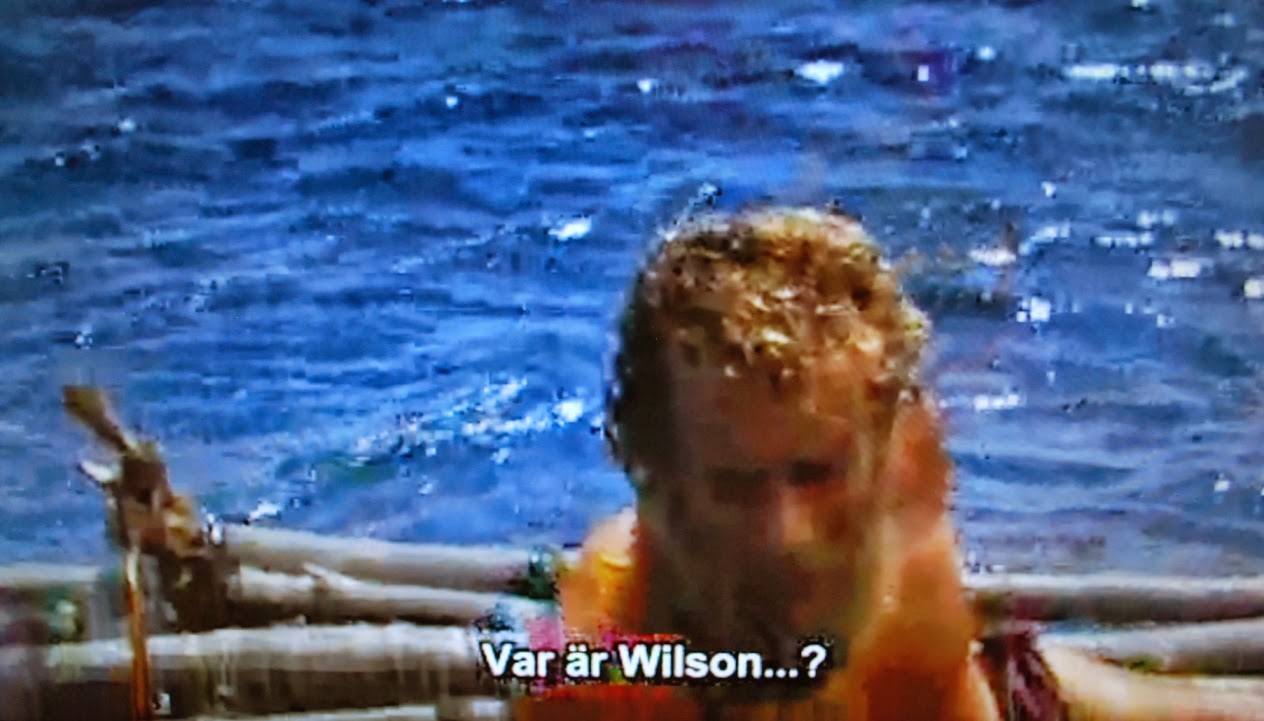
Tuesday 7th April 2015 - The Letter F, as in Forgive, which is Förlåt in Swedish.

As the parent of more than one child, you are often called upon to intervene when siblings squabble. I am trying to make this a short post about that wonderful little Swedish word 'förlåt', that you use when you apologise or ask for forgiveness. You demand of your child, 'Say you're sorry to your brother,' which in Swedish is "Säg förlåt."
Learning to apologise sincerely in childhood is an important lesson to learn for the future. There are many adults who don't know how to say that they are sorry and make things right in their dealings with other people, especially with those who are closest to them. To forgive and ask to be forgiven is an essential tool to have with you through life.
Another kind of difficulty is not being able to forgive oneself, when calamity gets the upper hand.
 |
| Tom Hanks, as Chuck Nolan, with his volleyball friend, Wilson. |
To illustrate this, I have borrowed a short segment from the 2000 film Cast Away, directed by R, starring Tom Hanks.
This story is about a time-management expert, Chuck Nolan, who works for Federal Express and who is the sole survivor of a plane crash in the South Pacific. In an inflatable rubber life-raft, he winds up on a tiny island with only the odd objects that are washed ashore from FedEx-packages from the sunken aircraft: a pair of ice skates, a volleyball and a party dress with a tulle skirt. After many failed attempts, he makes fire without matches or a lighter. He has no knife. He uses sharp rocks until he opens the FedEx boxes and finds the ice skates. He makes a fishing-net out of the the dress. When he cuts himself trying to start a fire or open a coconut, his bloody hand leaves an imprint on the volleyball that looks vaguely like a face. He calls it 'Wilson', and Wilson, the Volleyball, becomes his companion and sounding-board in his daily struggle to survive and find a way of off the island and to an area where ships more frequently pass.
For four years he is a prisoner on the island because the waves around the island are too strong to cross over. Until one day when a piece of scrap-metal in a good size and shape comes in with the tide. Chuck has a sail for his raft.
As we all know, even fast friends can have disagreements. One day, Chuck
Nolan gets so angry with Wilson that he kicks him out of the cave where he has
lived for four years. Regretfully, Chuck goes out looking for
Wilson and apologises to the volleyball after picking him up and
returning him to the cave.
'Never again', Chuck promises his round friend and takes him on the raft that will finally return him to civilisation.
'Never again', Chuck promises his round friend and takes him on the raft that will finally return him to civilisation.
 |
| Chuck is triumphant after sailing over the waves. |
 |
| Wilson on the raft. |
But
before Chuck Nolan is rescued, Wilson the Volleyball, falls off of the
raft and floats too far away for Chuck to retrieve him.
Chuck calls out
'I'm sorry!' to the lost volleyball. The Swedish subtitles have
translated this correctly as "Förlåt mig!" He doesn't have enough rope to reach the volleyball. He has enough good sense and survival instincts to know that he shouldn't let go of the rope to the raft.
But now is has lost his last friend, even if it was an imaginary friend.
This story about Chuck Nolan is, of course, fictional. But it to me, it rings true. My guess is that the screenplay is probably very well-researched when you compare it to some real-life accounts of people who have survived similar calamities. I don't remember his name, but one survivor of a solo journey on a raft over the Atlantic, said that he had to learn to forgive himself, when he made the wrong choices, like when he drank all of his drinking-water because he thought he was going to be rescued very soon, when in reality it took a much longer time for him to reach land, and he should have conserved his fresh water supply before he knew for sure how close he was.
Anyway. To forgive is one of the basics of being human.
Thanks for visiting.
Best wishes,
Anna













2 comments:
Forgiveness is good for the soul. Both for the forgiver and the forgiven.
Yes, we need to learn to forgive ourselves as well as people around me.
Thank you for your lesson in Swedish, too.
Letters from the Land of Cherry Blossoms
Post a Comment